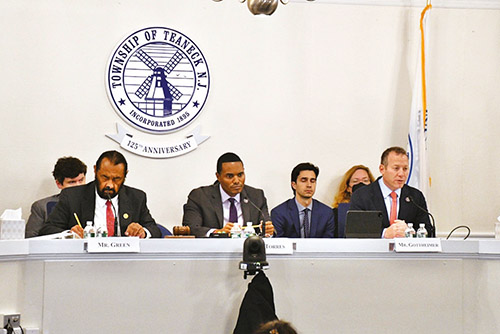
On Monday, October 3, members of the House Homeland Security Committee, including Congressman Josh Gottheimer (NJ-5), hosted a congressional hearing in Teaneck on countering violent extremism, terrorism and antisemitism in New Jersey.
The committee heard from several witnesses including the Anti-Defamation League’s New York/New Jersey Regional Director, Scott Richman; Holly Huffnagle, the American Jewish Committee’s U.S. director for combating antisemitism; Laurie Doran, director of the New Jersey Office of Homeland Security and Preparedness; Susan Corke, intelligence project director for the Southern Poverty Law Center; Rabbi Esther Reed, interim executive director of Rutgers Hillel; and Kenneth Stern, director of the Bard Center for the Study of Hate.
The morning began with statements from the witnesses with recommendations, followed by three rounds of questions from the committee. Congressman Richie Torres said “Combatting antisemitism is not and should never be the sole responsibility of the Jewish community. It is a moral obligation that should bind all of us.” He mentioned that the committee has jurisdiction over the non-profit security grant program and 30% of all antisemitic incidents in 2021 were concentrated in New York and New Jersey, with the most recent incident occurring at Rutgers University over Rosh Hashanah when AEPi, a Jewish fraternity, fell victim to vandalism when the fraternity house was egged.
“We are here today to examine in greater detail why antisemitism has risen so suddenly and sharply and what we in Congress can do specifically to aid state and local governments, as well as our community-based partners,” he said.
Congressman Gottheimer cited statistics compiled by the ADL that found that “the overall number of antisemitic incidents in New Jersey rose by 25% just last year, the most ever recorded by the ADL since tracking began.” He also noted that Bergen County had the highest number of incidents in all of New Jersey.
“That’s why I’m working to ensure we’re keeping North Jersey’s houses of worship, synagogues, temples and religious schools safe. I’m proud to have helped these organizations claw back more than $8 million in non-profit security grants to North Jersey while I’ve been in office—the most out of any district.” Gotthheimer also addressed the alarming rise in anti-Asian hate which increased by 339% last year compared to the prior year and the rise in hate crimes against the Asian-American Pacific Islander community.
With the rise in extremism and hate crimes across the country, he stressed the need to invest in, rather than defund, law enforcement and talked about the bi-partisan bill he introduced called The Invest to Protect Act, which passed the House overwhelmingly with bi-partisan support. The bill is aimed at ensuring local police departments across the US have the necessary resources to recruit and retain officers and provide training and mental health resources for officers.
He also introduced the bi-partisan FASTER Act—The Freezing Assets of Suspected Terrorists and Enemy Recruits Act. If passed, it will give law enforcement the ability to freeze the assets “of ISIS inspired, lone-wolf terrorist or other domestic extremists that are arrested on US soil.” According to the FBI, these types of terror threats are the number one concern, he said.
Doran talked about OHSP’s 2022 threat assessment, which designated homegrown violent extremists and white racially-motivated extremists as high-level threats. “In New Jersey, white, racially-motivated extremists primarily use propaganda distribution for conversion and recruitment purposes. Additionally, they may attempt to establish stronger ties in the state while stockpiling weapons and tactical equipment.” She then outlined ways that some of these risks can be mitigated, among them, more education and increased information sharing among law enforcement.
Richman said, “Hate and extremism are metastasizing, threatening our communities and democratic institutions…and the Jewish community continues to be a primary target.” Antisemitic incidents reached their highest number ever in 2021, a total of 2,717—which Congressman Gottheimer pointed out, averaged to over seven incidents per day—and that one out of every five incidents was perpetrated by known extremist groups or individuals motivated by extremist ideology. New Jersey came in second behind New York with a total of 370 reported antisemitic incidents.
Stern explained that “Antisemitism gets more traction when democratic norms are threatened, endangering more than just Jews.” He went on to say that when people are primed to divide others in this country into ‘us’ and ‘them’ it’s inevitable that antisemitism will grow.” He then offered recommendations that he came up with from hate studies that were conducted.
Corke spoke about the disturbing rise in antisemitism in New Jersey and in other parts of the country, and said, “Antisemitism, in addition to being a toxic form of prejudice is also an animating feature of white nationalist ideology.” She went on to say how white supremacy is now mainstream and urged the committee “to focus on the need to invest more in the prevention of radicalization.”
Rabbi Reed made two requests of the committee: More security funding for religious institutions and enhanced enforcement. She spoke about the vandalism at the AEPi fraternity over Rosh Hashanah, the fear her students experience over their Jewish identity and the numerous complaints across college campuses that have yet to be investigated. Speaking of all the antisemitism at Rutgers, she said, “Nobody wants Rutgers to be the next headline. Nobody wants Rutgers to be the home to the next tragedy.”
Huffnagle detailed a number of recommendations, compiled by the AJC, to help counter the rise in hate and antisemitism. Some of those recommendations included being prepared for patterns. For instance, during election cycles, Jewish holidays and flare-ups in the Middle East, there is a higher likelihood of antisemitic occurrences. She also suggested issuing unequivocal condemnations and researching ways to stop online proliferation. Collecting better data was another recommendation, since nearly 90% of cities do not report hate crimes to the FBI, she explained.
By Ronit Mershon









